Le Duel!
A Free Transcription
by Dennis Bartel
Liszt snorted and stomped. He vowed to cross swords with a man he’d never met, and in so doing bandy with the Parisian salonisti. At the stoked-pipe age of twenty-five, Liszt considered himself the undisputed pianistic champ of Europe. Had he not achieved greatness in Paris but eighteen months ago? Now, Paris had turned her back on him in favor of another virtuoso, and to this affront he, Franz Liszt, the virtuoso, would respond with all due harshness.
 He granted the salonisti one of their rants. He had been away from Paris too long, stealing through the shadows with the Countess he stole on his way out of town – the calm and alabaster Marie d’Agoult, wife of the Count. Theirs was a wondrous thing of naught, the two lovers electric with sin, triumph and amore. Or could it be, thought Liszt, the salonisti had tossed him over for the love of another virtuoso precisely because of his affair with the Countess? Was this his punishment on behalf of the Count?
He granted the salonisti one of their rants. He had been away from Paris too long, stealing through the shadows with the Countess he stole on his way out of town – the calm and alabaster Marie d’Agoult, wife of the Count. Theirs was a wondrous thing of naught, the two lovers electric with sin, triumph and amore. Or could it be, thought Liszt, the salonisti had tossed him over for the love of another virtuoso precisely because of his affair with the Countess? Was this his punishment on behalf of the Count?
Liszt swore. He threw a book violently across the room. Had the Parisian salonisti ever seen such a virtuoso as he? The answer: No! Will the salonisti, their smirking lips glossed with gossip, ever again see such a virtuoso as he? The answer: Not in this lifetime! How soon the capricious bels-esprits forget!
It was the break of spring. “Go to Paris,” Marie urged him.
Liszt swore Paris would be his again. He would rent asunder this – this – what was the man’s stupid sobriquet? – “Old Arpeggio?” The Parisians now loved someone named Old Arpeggio? Very well, he would go to Paris, rent asunder Old Arpeggio, and conquer the salonisti as he had conquered them before. Ah, such concerts he had given at the Salle Erard. Bacchic revelries they were. Dressed like a vagabond in London-tailored clothes, Liszt conquered the Parisians with virile charm and vigor. Hands lifted high, he stomped his feet while playing, his lank hair splattered across his shoulders. He could be volatile as a gypsy (“Outré!”), or with a cri de coeur be tender as an Adonis. What he did with his hands was barely allowable in haut monde – now caressing a supple phrase, now scurrying after lightening arpeggios, now swarming over thunderous chords. Ladies in frilly pantaloons trembled like poplar leaves. They shrieked. They tossed gems from their bosoms at his feet. Men watched agape. Paris had been Liszt’s felicitous conquest. It would be his again, he swore it!
Word had come to the shores of Lake Geneva, to Liszt and his golden haired Countess, Parisian heads had been turned by an impeccable virtuoso whose name was Thalberg. He was said to play with “exquisitely poetical and thoroughly finished execution,” and three hands.

“Three hands?” Liszt snorted at Marie. What contemptible carnival trick was this? He fired off letters to comrades in Paris, asking of this Old Arpeggio. Chopin, who knew pretense when he saw it, confirmed Sigismond Thalberg played well enough, even “excellently,” and took tenths as easily as he himself took octaves. “Younger than I,” reported Chopin, “pleases the ladies, makes potpourris out of rubbbish, wears diamond shirt buttons. Don’t be surprised only the tutti of my concerto pleased him. He gets his piano by the pedal, not the hand.” As for “three hands,” Chopin said it was nothing but dividing a third voice between the two hands by playing the melody with his thumbs. “I invented that little slight-of-hand years ago,” said Chopin, unimpressed.
Even in indignation, Liszt recognized the larger reason for going to Paris. He was a young man becoming himself and carried within him a genetic shred from antiquity telling him every talent must unfold itself in fighting. Had it not been so in ancient Greece? Young men fought for the right to enter the ranks of citizenry. Great contests were staged between brave men. For every one victorious, one was struck down. Liszt stopped himself. Didn’t that presume Thalberg was a brave man? From what Liszt had heard, Thalberg was a chump, and he, Franz Liszt, would kick the chump out of Paris. He, Franz Liszt, son of a sheep farm foreman who quit his job for the boy, risked it all, repudiated his own self, dispossessed himself of himself, relinquished, then took possession of the boy’s education and supervision, and the boy, a prodigy, astounding, but a boy all the same, who had yet to learn neither hope nor pride nor grief, traveled with his father to Paris, to the Conservatoire, the great house, to stand before the majestic Cherubini, who turned away the boy, repudiated him, and the father repudiated a second time, this time by the Conservatoire, and the boy who did not yet know the darkly shaded meanings of repudiation but would one day understand the great Cherubini master of the Paris Conservatoire repudiated him not for a lack in his own young genius but for the crime of not being French!
Liszt saw himself as an Artist-Hero with an infinite future. He believed the future was here and now. It would not be enough merely to reconquer the hearts of the snide and fickle Parisian salonisti. Liszt would have to destroy this Thalberg chump.
Marie preferred not to face the grinning French scandal mongers. She remained at Lake Geneva while Liszt left home without her, by private coach. He arrived in Paris wearing a wide-brimmed black hat and great coat. Hardly had he wiped the road dust from his brow when a cadre of his obsequious apostles, who had got wind of his coming, informed him, as ill chance had it, Thalberg left for Vienna only yesterday. Liszt scoffed. A likely story. Old Arpeggio must have fled in fear when he learned of the Master’s coming. “No,” cried one blue farouq, “Thalberg was named Pianist to the Imperial Court!”
The urgent look in the eyes of these sycophants gave Liszt pause. He quickly sought out a circle of his best informed and most sophisticated comrades and posed the ardent question: “What of Thalberg?”
The answer: Thalberg was unarguably a talented pianist, with large grasp and stretch of finger. His playing, at times, could be described as stirring, or as the critic penned, “as if you swam in an ocean of light.” But he was no Liszt, no dynamic genius. Au contre! What Thalberg did was deceptive but easy. He placed the melody in the tenor center and played it with his thumbs, then embellished it with an assortment of well-worn pianistic novelties, especially florid arpeggios, then deepened the sound with a sostenuto pedal. Liszt’s comrades assured him that while audiences ignorant of real musicianship devoured Thalberg’s trifles, his so-called virtuosity amounted to a fragrant bouquet of arpeggiated chords and filigree scales. Well, maybe Thalberg could also play some difficult trills, said the comrades. Very well, his passagework was, let it be said, “exquisite.” His double thirds and sixths opened the eyes, of some perhaps. His counterpoint? It was, how to say, better-schooled than Liszt’s own. Also, the comrades had to admit, Thalberg, though of humble origins, possessed the air of an aristocrat, from blue blood to savoir-vivre. They verified for Liszt there were now as many Thalberghites in Paris as there had once been Lisztians!
“And the ladies?” Liszt asked urgently. “Les mesdames et demoiselles?”
Thalberg, they reported, made the ladies languish in their seats.
Liszt promptly set about paying visits to Parisian élites, posing, as he wrote home to Marie, “with a certain dignified and superior simplicity, just the way you like it.” He held private dinners at his temporary digs, to which he invited influential salonisti. At some crucial point of each dinner, Liszt stood at the head of the table and promised to the assembled élites he, Franz Liszt, would soon return to the stage to recapture their highest affections.
Mon dieu! said the two-faced Brahmin. Liszt was their champion. Who could even think of anyone supplanting Liszt as their champion? S’il vous plait!
Liszt arranged to perform one of his musical soliloquies at the site of former triumphs, the Salle Erard. Four-hundred salonisti crowed into the gas-lit rooms and chattered excitedly amid the decorated mirrors and painted cherubs.

Liszt’s artiste-in-arms, Hector Berlioz, attended the Salle Erard that night. Later, writing in the city’s top arts rag, Revue et gazette musicale, Berlioz set the stage. “Erard’s rooms were literally besieged by the public, among whom were not only the indifferent, but even the hostility inclined curious.”
Liszt entered. A Liszt entrance was a masterful stroke all its own. Every movement had been well practiced before a mirror – a compelling mélange of bonhomie dignity and savoir faire. Liszt possessed a gift for le grand geste. He threw flung the gauntlet to Thalberg by playing the Hammerklavier. “The Sphinx’s enigma of almost every pianist!” raved Berlioz. “Liszt, another Oedipus, has solved it in a manner that, if the composer could have heard it in his grave, would have sent a thrill of joy and pride over him. Not a note was left out, not one added (I followed, score in hand), no inflection was effaced, no change of tempo permitted. Liszt, in thus making comprehensible a work not yet comprehended, has proved that he is the pianist of the future.”
Thalberghites viewed Liszt’s display as a naked act of jealousy and envy. They rained scorn down upon his head.
Liszt returned their scorn with a pleading hand. “The lyrical quality of my playing – this is love.” Love for Parisians, whom he wished to please above all others. To prove his love, he staged a second musical soliloquie. Berlioz barked ecstatically in Revue et gazette musicale: “The Liszt of today has taken so extraordinary a flight, has soared up with such rapidity above all hitherto known summits, one can boldly call to those who have not heard him lately, ‘You do not know Liszt!’”
Satisfied with his showing, our Artist-Hero declared for all to hear, “Le concert, c’est moi,” and left the toffee-nosed snobs among the Parisian salonisti behind; returned to Lake Geneva to nest with his Countess, she of long, liquid gestures and poetic strokes of pen.
Six months later, Berlioz asked for a pay back. Would Liszt come to Paris and join him in a concert? Liszt, a man of loyalty whenever loyalty served his muse-driven spirit, agreed straight away. He promised to play one of his own transcriptions of one of Berlioz’ fantastique orchestral scores. And this time, Liszt decided, Marie would accompany him.
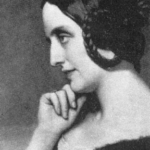
To be sure, it was not Marie’s wish to return to gossip-plagued Paris, to the scene of her crime and the cradle of her abandoned husband’s friends and colleagues? Count d’Agoult was esteemed, the honorable wronged man. The Countess was despised, la femme terrible. When Liszt made his abrupt demand for the Countess to come with him to Paris, she feigned faintness. Perhaps he should go without her, she said.
Liszt immediately announced he would cancel the trip.
No, he should go, said Marie.
“Absolutely not!” Liszt shouted. “You are my inspiration! I need you there! It is a matter of utmost importance!”
But he went last time without her?
“That was different!”
How?
Liszt demanded to know if Marie was saying she would not go with him?
Marie said he had arranged the trip without consulting her, he could go on the trip without her.
To which our Artist-Hero responded by smashing his fist through a window pane; risking career-ending injury to get his way. Marie went with him to Paris.
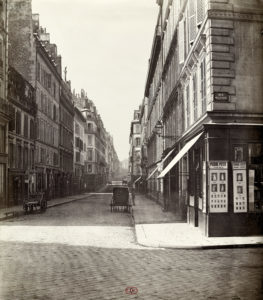
Back in the City on the Seine, they took an apartment at the Hôtel de France, Rue Lafitte. In mid-December, Berlioz’ concert was staged, at which Liszt was amazed and dismayed to find the salonisti embittered toward him. The buzz said they resented his egomaniacal outburst of the past spring. They greeted Liszt in silence. From the stage he could see in their faces – the name Thalberg was still the sweetest on Parisian lips.
Liszt put on a clinic in graciousness and artful verve. He won over the small audience. Seizing the moment, he announced from the stage he would mount four concerts. But this time not musical soliloiques. Rather, chamber music soirées, with his comrades Urhan and Batta, violinist and cellist.
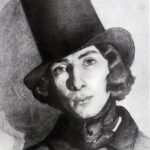
It so happened, at this time George Sand was enjoying a splendid success from her anti-société novels Indiana and Lélia, which in five years had made her famous. Wherever Sand went, the salonisti followed, and where she went this winter was the Hôtel de France, where she took an apartment above her friends Liszt and Marie. Sand and the Countess collaborated on a salon, and suddenly Liszt, instead of having to seek out and court the salonisti, was holding court as they came to his home. They filled Marie’s and Sand’s rooms with gossip and blue smoke from their black cigarettes. Liszt loved the smell of both. Among those present was the cream of the salonisti – such as Guillaume Tell tenor Adolphe Nourrit, whose great career had yet to begin its tragic slide down its suicidal slope; and Buch der Lieder poet Heinrich Heine, who had come to Paris sniffing revolution and stayed spitting versified satire; and the gloriously décadent Abbé Lammenais; and Sand’s young ex-lover the writer Alfred de Musset, declaiming anti-classicism. Liszt thought Chopin would fit right in, and invited him to the salon. Chopin, of nervous, effeminate manner, did not at first hit it off with his hostess, the raven-haired George Sand. (But that’s the story of a different duel.) Among these sharp-tongued salonisti, Liszt goaded every impulse to bad mouth Thalberg, then smiled slyly as he listened. The Mephistopheles in him.
In his chamber music soirées, Liszt mostly shunned his own works in favor of Beethoven piano trios and violin sonatas, and solo works of Chopin and Moscheles. The re-enlightened salonisti did not let him down. “Such furore!” exclaimed Heine. “Liszt threw the mind into a state of distress and blessedness at the same time.”
Liszt believed he had made great strides toward winning back the hearts of Parisians, but understood he would have to confront his rival directly if he was to ultimately stand victorious. He gathered all the Thalberg scores he could find – fantasies, impromptus, divertissements – all based on fanciful popular tunes. Couldn’t this Thalberg write anything original, Liszt asked himself? Must he always begin with another’s kernel of genius? “I shut myself in for a whole afternoon to study them conscientiously,” said Liszt. His conclusions (which Marie put into words for Revue et gazette musicale) were poisonous. All this palpitation by Paris was over pretentious, monotonous music. “Mediocre, insignificant compositions.”
Thalberghites unleashed a spiteful battery of their own, led by the éminence grise of musical Paris, F.J. Fetis, who blamed Liszt’s vain gloriousness and violent temperament for his “unmotivated attack.” Fetis, whose catty vitriol was a prototype for many a critic to follow, lashed out at Liszt directly. “We will not say that a happy idea may not one day shine into your mind, but until now it is not so. You are the offspring of a school which ends and has nothing more to do; you are not the man of a new school. Thalberg is that man. That is the whole difference between you.”
Liszt was stung. He returned a salvo: “To Professor Fetis”. Only artists should criticize artists. Incompetent men should shut up and stay out of it. Then Liszt saw to his horror that in his haste to defend himself against the critic he had unwittingly placed Thalberg upon the same artist’s mantle as himself. Thalberghites tittered.
Marie cried that she could no longer stomach the dishy salonisti and the brewing tempête. She wished her man every good fortune in this latest fight of his, but she was leaving with George Sand to Sand’s country house at Nohant, near Châteauroux, which Sand had acquired in her divorce settlement. From now on, Marie preferred to follow the bloody events only through communiqués, thank you, and she would rejoin Liszt when it all died down, preferably somewhere other than Paris. She left before Liszt could stop her, not that he tried to stop her, for he was now transfixed by a new development.
Thalberg had returned to Paris. Old Arpeggio was promptly hustled by his loyalists to a private soirée to hear Liszt play, after which Thalberg admitted among friends, with cryptic eyes, alas, he probably could not play any of Liszt’s music. When told of the remark, Liszt sniped back, “Too bad for him. It must make him malheureux.”
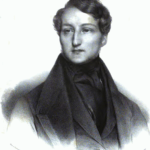
But Thalberg’s deference did nothing to sway the sentiment of the mobs, and Liszt knew it was only a matter of time before the mobs pressed him together with Thalberg. He took the initiative and went, alone, directly to his rival. At last, he would see for himself this beacon of gentility, this Old Arpeggio of the three hands.
The two men came together in a foyer, face to face, absent servants and seconds. Thalberg stood a head taller. Liszt could not muster his Artist-Hero dignity and superior simplicity. He managed only the unsmiling graciousness of a Bonaparte. He proposed to Thalberg they play a joint concert.
Thalberg was handsome, undeniably, if one favored the olive-skin, sleepy-boy poet look. Liszt preferred the chiseled Athenian look as his ideal. Thalberg peered down his majestic nose and replied with the brittle chill Liszt found so evident in the man’s sparkling music, “No, I do not care to be accompanied.” Trash talk from Thalberg.
Now Liszt hated him. No longer was Thalberg merely a rival. Now Thalberg was an enemy with a face and a condescending hauteur, a despicable fraud who must be exposed. Liszt went to see Thalberg play at a soirée and afterward loudly scoffed, “The only one I know who can play the violin on the piano.” Guffaws all around, among Lisztians. “He lacks what it takes to be an artist,” Liszt said smiling wickedly.
Again, even in the midst of his petty rage, Liszt saw deeper. He understood Thalberg stood before him as a mirror distortion of himself. That which was good in Thalberg – precision, self-control, “everything so calculated and so polished,” as Mendelssohn described – became what was bad in Liszt. And that which was bad in Liszt – loosely-bolted technique, unbridled egocentricity, “inspired affectation,” as the piano pedagogue Friedrich Wieck described – became what was good in Thalberg. Liszt’s weaknesses were Thalberg’s strengths. For Liszt, a fight to the death was now inevitable. The stakes had soared to include the greatest risks. A defeat most primal awaited the loser.
Liszt announced he would play a soirée the evening of March 12, a Sunday. Thalberg countered by announcing his first concert of the season, a matinée on the same day. Liszt had been out-maneuvered. He postponed his appearance one week.
Thalberg played in the Conservatoire’s Théâtre Italien, a narrow and intimate space seating four-hundred. All four-hundred Thalberghites were buoyant toward their favorite, who, it is said, played with characteristic élan. His Fantasia on God Save the King won extra Bravos!
Liszt changed his venue to the three-thousand seat Opera House. No pianist had ever dared attempt to fill such a tremendous space with the sound of a mere piano. But Liszt, seated in the middle of the immense stage, before the Opera House’s mixed sea of sophisticates and unwashed, brought forth from the instrument such sounds as to flood the great cavern with uproarious noise – and fanaticism.
Thalberghites proclaimed their man to have given the more artistic concert. Lisztians proclaimed their man to have given the greater concert. Each side hurled invective at the other. They could agree on but one thing: the time for a duel was nigh.
Liszt, for one, was itching for the fight, though Marie cautioned him from Nohant to maintain a posture of dignified indifference. Thalberg, it seems, needed to be persuaded, and it would most likely take a charming woman to do so. For all of Liszt’s legendary love-making, Thalberg too had a taste for the ladies.
The charmer to emerge for this moment of history was Cristina Belgiojoso, émigré Princess from Italy, wife of the Prince, and celebrated salon salope. A black-haired beauty, pale, Cristina was a friend of Marie and had recently visited her at Lake Geneva. The Princess was the Italian heiress with the greatest wealth. Her marriage to the Count was, open, for the Count was open about his many infidelities but neither of them wished to go through the unsavory ordeal of a divorce. They lived separate lives, and the Princess’ life, eventually, following her husband’s example, included falling into the arms of many an artist. Christina knew Liszt through Marie, and from his previous conquests in Paris. The noblewoman of Belgiojoso was an activist writer for Italian independence and claimed to know a few things about fine piano playing, as she was herself an accomplished amateur.

Princess di Belgiojoso invited the two pianists to perform a joint concert at her mansion salon as a benefit for Italian refugees. Her invitation was loudly echoed by both vociferous camps. Liszt first, then Thalberg, accepted. The Princess set the ticket price at forty francs. Only the diamond élite would be there. Revue et gazette musicale caught its journalistic breath. At long last a duel to settle “the indecisive balance between Rome and Carthage.”
A few nights later, March 31, the scene was the Belgiojoso salon, where stood two buffed and shiny black grand pianos. Devotees of either lodestar crowded into the chamber which was lavish with drapes and cushions of black velvet and silver fixtures. Fetis was there, as was Heine. Chopin came. Berlioz’ absence may be attributed to a ticket price too steep for a boho artiste.
The graceful Princess presented the two pianists to the assembled. They shook hands and spoke gratuitous well wishes. Liszt would play first. He took his place at the piano and removed his green gloves. He sat a moment, his long hair framing his face like a monk’s cowl. Then he lunged at the keyboard, nearly threw himself upon it, his fingers racing over the ivory in twisted, senseless chaos as if each finger lived an independent life. Liszt’s face appeared now agonized, now radiant “like the paintings of Our Saviour by some of the early masters,” said an observer. His nostrils dilated, he shook his mane. His hands raised high and came crashing down in torrents of sound. He played his Niobe Fantasie, a divertissement on the cavatina from Pacini’s opera, treating the famous tune from the famous opera with gusto, here and there dipped in pathos. It could not but find favor with the patriotic Princess. The audience was exultant!
Now came Thalberg in high-collar, erect and prim. For all his three-handed tricks there was barely a visible movement as he played. “His whole bearing as he sits at the piano,” said an observer, “is soldier-like. His lips are tightly compressed and his coat closely buttoned.” As Liszt had his mirror to refine the drama of his movements, Thalberg had come by his motionless manner by smoking a Turkish pipe while at work on exercises. His style was singing and unfailing. He pressed, rather than struck, the keys, with sure-fingered dash and velocity, but as if “with a boneless hand and fingers of velvet.” It was luscious playing, especially his oft-tested crowd-pleaser, Moses Fantasia, in which, said the critic, “layers of sound give the impression there are two players and that the instrument wants to give birth to another.” The audience swooned.
Ten other musicians participated in the soirée, playing chamber works around the alternating virtuosos. By the end of the evening there was – could it be? – no consensus of opinion. Again the Lisztians boasted of their man’s virile strength and expressiveness. Again the Thalberghites pointed to their man’s flawless precision and refinement. They left the salon muttering critical jargon – “voluptuous histrionics” and “three-hand misteroso.”
Princess di Belgiojoso felt unsatisfied. The affair had been a succès beaucoup (look at the funds raised for refugees!), except it lacked a final resolution. There should have been a winner. So the Princess promptly announced a second benefit concert. This time, instead of two buffed and shiny black grand pianos in the Belgiojoso salon, there would be six. Two old favorites were invited to play, Johann Pixis and Carl Czerny, who had been teachers of Liszt and Thalberg, respectively. Henri Herz was also invited, whose sympathies lay with Thalberg – as was Chopin, whose sympathies lay with his friend Liszt. The Princess further invited each of the six artists to compose a set of variations upon one of her favorite marches from I Puritani, by her beloved Bellini. And this time, the Princess would not leave the decision to consensus. It was her party, she would name the winner herself.
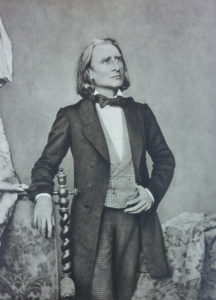 Liszt retired to the solitude of his rue Laffitte apartment and composed a set of variations by borrowing ideas here and there from earlier works of his which had won favor with the salonisti. He had to give them what they expected. He accentuated his finest traits, played to his strengths. He rippled and crescendoed. But Liszt was no slave even to his own genius. He understood what had not won him back the hearts of the salonisti in his previous efforts, however much favor they found in them, would fail him again this time as well. So upon finishing the variations, he also wrote something else. This they would not be expecting. A secrète. He would use it, at the crucial moment, to pluck the heart out of this bâtard d’aristocratie Thalberg.
Liszt retired to the solitude of his rue Laffitte apartment and composed a set of variations by borrowing ideas here and there from earlier works of his which had won favor with the salonisti. He had to give them what they expected. He accentuated his finest traits, played to his strengths. He rippled and crescendoed. But Liszt was no slave even to his own genius. He understood what had not won him back the hearts of the salonisti in his previous efforts, however much favor they found in them, would fail him again this time as well. So upon finishing the variations, he also wrote something else. This they would not be expecting. A secrète. He would use it, at the crucial moment, to pluck the heart out of this bâtard d’aristocratie Thalberg.
Bâtard? In a manner of speaking, yes, in that the man Thalberg claimed as his father was not his father. Liszt had sources among his loyalists. He had learned that twenty-four years earlier Sigismond Thalberg was not, as he portrayed himself, born to the humble Thalberg family of Frankfurt. His parents were the Count Moritz Dietrichstein and the Baroness von Wetzlar, whose common bond was not legal but lustful. The filthy nobles had quietly placed their illegitimate infant in the foster care of the Thalberg family, and persuaded Joseph Thalberg with an ample endowment to assume the role of father to the boy. But what was Liszt to do with this knowledge? Was he to pronounce Thalberg a fraud for possessing the air of an aristocrat when in fact he really was one? Liszt swore and kicked a chair. À bas, le bâtard!
And so arrived the dénouement. The salonisti returned, this time smelling blood. Bellini was ringside. Liszt played first, and came out smokin’. His I Puritani variations were bravura sans pareil. Oh, the gaudy splendor Oh, the transcendence!
Then came Thalberg in his bon ton style – the crisp staccato, the high-wire filigreed runs.
“Fils de pute,” muttered Liszt.
Pixis and Czerny followed, then Herz. Chopin, who was tight with Bellini, played a set of slow, sentimental bel canto variations to bring the concert to an end.
Or was it the end? Liszt saw the salonisti’s response was the same as it ever was. Now was the time to strike. He gestured to Princess di Belgiojoso that he would assume his place at the piano a second time. The Princess assented with a conspiratorial nod. Liszt played his secrète: a second set of three variations on the same Bellini theme, one played à la Pixis, one played à la Herz, and yes, one in the three-handed manner of Thalberg! Chopin had been right, it was an easy trick. Liszt had picked it up on his first try.
The salonisti howled! “Touché!” Thalberg sat stunned and livid, with a look that said, The vulgarian is making ridicule of me. Such mauvais goût, such a sickening, contemptible, childish outburst.
When the uproar subsided, Princess di Belgiojoso took the floor and issued her decision. “Thalberg is the first pianist in the world. And Liszt is the only one!”
Later, Liszt would lament to George Sand, “A pitiful contest,” however pitifully hard he had striven to win it, and “a fruitless endeavor,” however sweet the fruits of victory had tasted on his smiling lips. Liszt even granted Thalberg a measure of grudging, back-hand respect by declaring, “Son genre est petit, mais il est grand dans son genre.” As for Liszt’s own genre, it remained grand. For he was an Artist-Hero with an infinite future. Today he had re-conquered Paris, tomorrow the world.